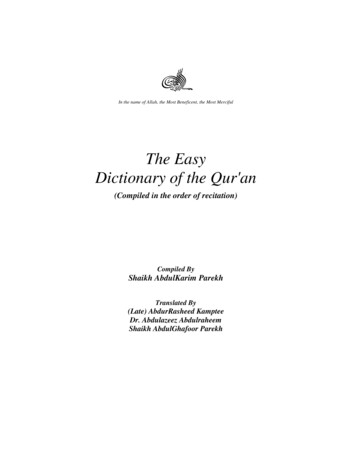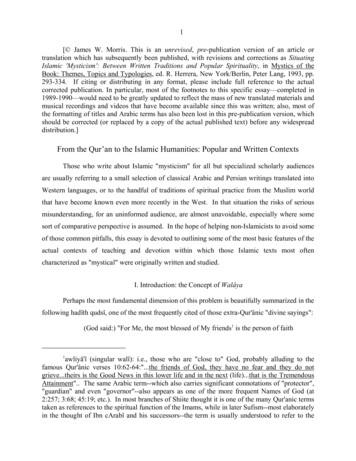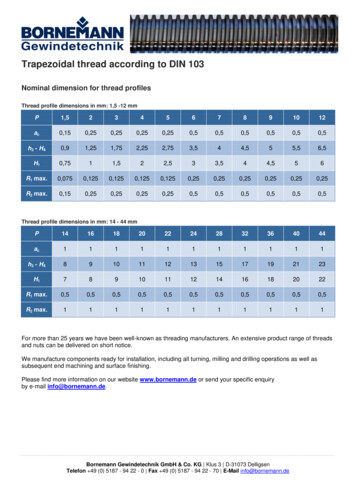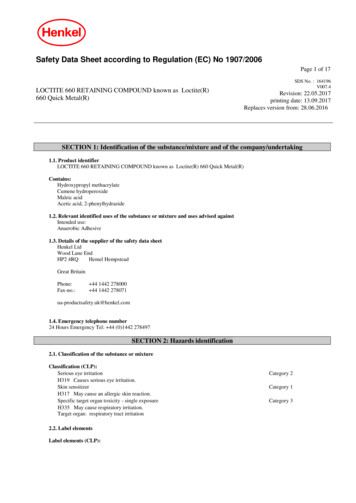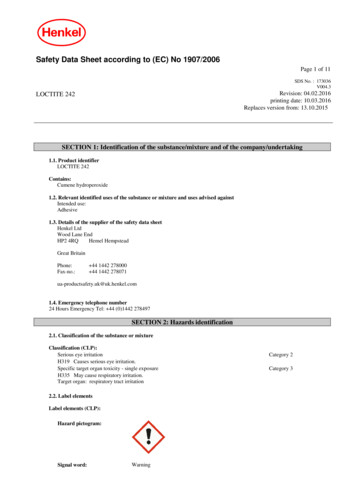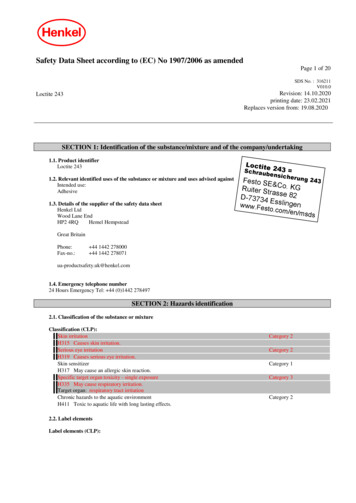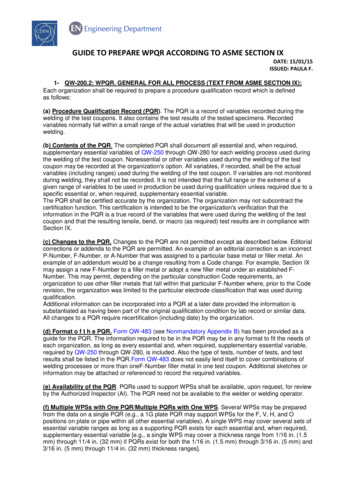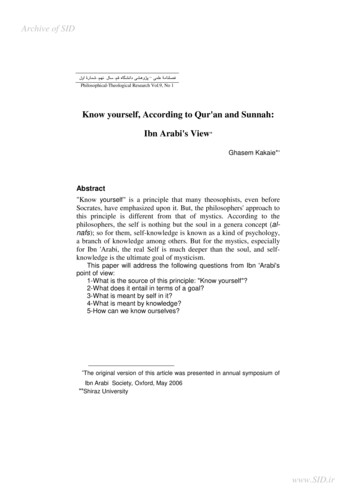
Transcription
Archive of SID ﺷﻤﺎرة اول ، ﺳﺎل ﻧﻬﻢ ، ﻓﺼﻠﻨﺎﻣﺔ ﻋﻠﻤﻲ – ﭘﮋوﻫﺸﻲ داﻧﺸﮕﺎه ﻗﻢ Philosophical-Theological Research Vol.9, No 1Know yourself, According to Qur'an and Sunnah:Ibn Arabi's View*Ghasem Kakaie**Abstract"Know yourself" is a principle that many theosophists, even beforeSocrates, have emphasized upon it. But, the philosophers' approach tothis principle is different from that of mystics. According to thephilosophers, the self is nothing but the soul in a genera concept (alnafs); so for them, self-knowledge is known as a kind of psychology,a branch of knowledge among others. But for the mystics, especiallyfor Ibn 'Arabi, the real Self is much deeper than the soul, and selfknowledge is the ultimate goal of mysticism.This paper will address the following questions from Ibn 'Arabi'spoint of view:1-What is the source of this principle: "Know yourself"?2-What does it entail in terms of a goal?3-What is meant by self in it?4-What is meant by knowledge?5-How can we know ourselves?***The original version of this article was presented in annual symposium ofIbn Arabi Society, Oxford, May 2006Shiraz Universitywww.SID.ir
Archive of SIDIn this paper, the importance of self-knowledge in Ibn 'Arabi'sphilosophy, the reliability of the two above mentioned hadiths for him,and his different interpretations of them will be discussed in thecontext of his theory of oneness of Being (wahdat al-wujud). Also,"fanaa" which is the result of self-knowledge will be discussed fromIbn 'Arabi's point of view and his understanding of this term will becompared with the doctrine of the annihilation, according to otherphilosophical and mystical traditions.Key Words: Ibn ArabiSoul and BodyUnion with GodOneness of Being1-The Importance of knowledgeThe search for knowledge is one of the most central concerns toIslam. The value of each human being is determined by the degree ofhis knowledge. The Qur'an asks: "Are they equal those who know andthose who know not?" The answer is self evident. That is why thatRumi says: "Oh my brother you are nothing but knowledge / otherthan this you will be only bones and flesh"(9,vol.2,277).Hence, as the Prophet (s) said: "The search for knowledge isincumbent upon every Muslim." Knowledge is so important that God,counting and reminding His graces and favors, the first thing thatmentions is knowledge and He Introduces Himself as "Giver of theknowledge". He Says: "The all merciful. He taught (and gave theknowledge of) the Qur'an." After that He Says, "He created humanbeing."(55:1-3). It means that Knowledge is more important than thecreation of human being. In another verse God says: "I created Jinnand mankind only to Worship me"(51:56). Many commentators suchas Ibn Abbas have reported from the Prophet (s) that the meaning of"to worship me" is "to know me". So, knowledge is the goal of thecreation of mankind. And this goal has no an end and is not limited,such that the most Knowledgeable of all human beings, the Prophet(s), has been commanded to pray: "My Lord increase me inknowledge"(20:114). That is why, in contrast to many Sufis whoemphasize love more than knowledge, Ibn Arabi emphasizesknowledge. He says:God never commanded His Prophet to seek of anythingexcept knowledge, since all good lies therein. It is the7www.SID.ir
Archive of SIDgreatest charismatic gift. Idleness with knowledge isbetter than ignorance with good works. Knowledge is adivine attribute of all encompassingness, so it is the mostexcellent bounty of God. Hence God said (in the story ofMoses and Khizr): "[Then they found one of our servants,whom we had given mercy from us], and whom we hadtaught knowledge from Us", that is, as a mercy from Us.So knowledge derives from the mine of mercy(4,vol.2:370).2-The Object of KnowledgeThere are infinite things in the world which we do not know andwhich can be the object of our knowledge. On the other hand, we havea limited life and can not seek knowledge of everything. We mustseek the important knowledge and we must begin from the mostimportant one. And the most important and the most necessaryknowledge is the knowledge of God and knowledge of everythingwhich is in relation to God. The Prophet (s) used to pray, "I seekrefuge in God from a knowledge which has no use"(11,vol.5,70).Useless knowledge is that which is disconnected from its source andorigin, that is Divine Reality. That is why Ibn Arabi says: "Byknowledge I mean only knowledge of God, of the next world, and ofthat which is appropriate for the world, in relation to that for whichthis world was created and established"(4,vol.2,370). And as we saw,the aim of creation was knowledge of God. Ibn Arabi says:The Prophet (s) said, "When God struck His palm betweenmy shoulders, I came to know the knowledge of lateancients and the later folk through that placing of thepalm." So through that striking, God gave him theknowledge of God. Knowledge of other than God is awaste of time, since God created the cosmos only forknowledge of Him. More specifically, this is the case withwhat is called "mankind and jinn", since He said clearlythat He created them to worship Him.(4,vol.4,221)And we saw that the meaning of "to worship" was "to know".3-How can we have Knowledge of God?We live in this physical world and we have not any direct accessto God who is infinitely beyond this world. We only can know this8www.SID.ir
Archive of SIDworld directly. And this world is other than God. So, is knowledge ofthis world a waste of time according to Ibn Arabi? The answer in no.Since no knowledge of God can be gained without an intermediarywhich is other than God. So other than God is as important forknowledge as God Himself(2,148). According to Qur'an, all things are"signs" of God. They refer to God and point to Him. According to IbnArabi, the root of the word 'Alam (cosmos) is 'alama (mark). He says:"We mention the "cosmos" with this word to give knowledge that by itwe mean that God has made it a mark" (4,vol.2,473).Ibn Arabi usually employs the term dalil which is a synonym toaya (sign) and it means that everything is a guide, directive, pointer,indication, signifier, evidence, proof, and denotation of God. It isimportant that the verses of Qur'an are also referred to as signs or'ayat."For the one whose soul is in the manifestation of God/ the wholecosmos is a book of God, the Sublime"(12,52)4-Knowledge of the SignsThe signs and verses of God are found in the Qur'an. But they arealso found in the outside world (macrocosms) and within our selves(microcosms). The Qur'an says, "We shall show them our signs uponthe horizons and in themselves, until it is clear to them that He is theReal"(41:53). "Horizons" refers to the world that we see outside us,while "themselves" refers to the world of inner experience. In IbnArabi's view the basic sense of this verse is: "Your signifier to theReal is yourself and the cosmos"(4:307.1). Self and cosmos are tworealities within which the Reel's self-disclosure may be witnessed. Hesays:The Law-giver turned you over the knowledge of yourselfin knowledge of God through His words, "We shall showthem our signs (which are the signifiers), upon thehorizons and in themselves." Hence He did not leaveaside anything of the cosmos, for everything of thecosmos that is outside of you is identical with thehorizons, which are the regions around. "until it is clear tothem that it is the Real" nothing else, because there isnothing else(4,vol.3,275).So the world which is other than God comes into the picture onlyto the extent that one must know the other in order to gain knowledge9www.SID.ir
Archive of SIDof God. It means that the other must be known with a view towardGod. All things must be taken back to the one, which is God.Knowledge of other than God, the knowledge of horizons and ofourselves, is an intermediate for knowledge of God. Philosophers andtheologians deduce the existence of God from the existence of theworld. They also deduce God's attributes from the attributes of theworld. They have different arguments for this purpose. Each one ofthese arguments appeals to one of the aspects of the macrocosms ormicrocosms. For example, from the existence of the good order in theworld they deduce the existence of a knowledgeable designer. Or fromthe existence of the motion in the world they deduce the existence ofan unmoved mover. And from the existence of "possible beings"which is the world, they deduce the existence of a necessary beingwhich is God and so on. All of these arguments approach to theknowledge of God from the knowledge of the horizons.5-Knowledge of the SelfAlthough both the horizons and the selves are God's signs andguide to God, in many Sufi texts the emphasis is upon the knowledgeof the self. Ibn Arabi sees knowledge of the cosmos as secondary tothe knowledge of the self.There is a very famous saying in this relation which is usuallyquoted as a hadith of the Prophet (S). The Prophet confirmed theimportance of seeing the signs of the self by saying: "He who knowshimself (his soul) knows his Lord". This hadith is not accepted by thespecialists, but it has a very important role for Sufis, especially for IbnArabi. In another hadith the Prophet (s) said: "He who knows himselfbest, knows his Lord best"(13, 4). In a third hadith the Prophet (s)said: "God created Adam in His form". This hadith is used by Sufis asa reason for the other two hadiths. Why we can gain knowledge ofGod from the knowledge of ourselves? The answer is: Because Godcreated Adam in His form.But there are some debates on the "sanad" or "authenticity" of thisthird hadith. In addition, some of those who have accepted the "sanad"of the hadith have said that the pronoun "his" in the hadith refers toAdam and not to God, which means that God created Adam in Adam'sown form. At best, the meaning of the hadith is ambiguous because ofthese two different possibilities(7,283). So in order to use the first and10www.SID.ir
Archive of SIDthe third hadith, we must firstly show their authenticity and, secondly,remove the ambiguity from the third hadith. How does Ibn Arabi dothat?6-Authenticity of the HadithIn the Qur'an God, referring to human being, says: "We are nearerto him than the jugular vein"(50:16). Ibn Arabi inspired by this versesays to the scholars: "If He is with you through this kind of nearness,while you claim to have knowledge of that and faith in it, why do youfail to take from Him? Instead you take from others and you do nottake from Him"(1:280). Then he quotes the famous saying of AbuYazid that addressed the esoteric scholars with his words: "You takeyour knowledge dead from the dead, but we take our knowledge fromthe Alive who does not die"(Ibid).In this way, Ibn Arabi sometimes has an extraordinary method inquoting a hadith. It means that sometimes the sufi or the mystic in hisunveiling, visits the Prophet (s) and hears a hadith or saying directlyfrom the Prophet. So he is exactly in the same situation of thecompanions of the Prophet who visited him and heard the hadithdirectly from him. Unveiling provides the means whereby theauthenticity of such hadith has been tested.So, Ibn Arabi quotes in this way, the hadith, "He who knowshimself knows his Lord", directly from the Prophet (s). In the case ofthe ambiguity of the pronoun "his" in the hadith "God created Adamin His form", Ibn Arabi points to another version of the hadith. Hesays: "In a saying that has been shown to be sound (sahih) byunveiling (kashf), it has been said that "God created Adam in the formof the All-merciful (al-Rahman)" though this version isn't accepted bythe authorities of the transmission of the hadith. Thus the ambiguity isremoved (4,vol.2, 490).Hence according to these hadiths, the best way for gainingknowledge of God is the knowledge of the self, because God createdAdam in His form. Ibn Arabi says:The messenger of God said that there is no path to theknowledge of God but knowledge of self, for he said: "Hewho knows himself knows his Lord". He also said: "Hewho knows himself best knows his Lord best." Hence Hemade you a signifier. That is he made your knowledge of11www.SID.ir
Archive of SIDyourself signify your knowledge of Him (4, vol2, 298.).He also said in another place:There is nothing outside of you, so do not hope toknow yourself through other than yourselves, for there isno such thing. You are the signifier of you and of Him,but there is nothing that signifies you (4, vol.3, 319).7-Different Interpretations of the hadithThere are different interpretations of the above hadiths. Even IbnArabi himself interprets them in different ways. We can divide theminto two main approaches: Philosophical and mystical. It seems thatthe differences between these interpretation rise from the followingquestions:What is meant by "nafs" in the hadith: Soul or self? Because theword, "nafs", in Arabic means "soul", but when it is added to apronoun, it can be a reflexive pronoun, which may be animate orinanimate. In this case it is like the word "self" in English. So "nafsah"can be translated either as "his soul" or as "himself". Consequently,the above mentioned hadith can be translated as: "He who knows hissoul knows his Lord", or as "He who knows himself knows his Lord".We will discuss the difference between these two meanings later.1. Does the hadiths talk about the "similarity" between the selfand God, or they imply the "union" or the "unity" of them?2. The third question is about the meaning of "his Lord". Does itmean the essence of God or it means God as a creator? Whydoes it say "his Lord" and not "the Lord"?3. Finally, what kind of knowledge is meant here? Does thehadith talk about knowledge by gaining which is "knowledgeof something" or it talks about knowledge by presence that is"knowledge which is something"? In the former, the known,the knower and the knowledge are different things but in thelatter, the known, the knower, and the knowledge are one andthe same thing.8-Philosophical Approach and InterpretationsIn thi
Ibn Arabi sees knowledge of the cosmos as secondary to the knowledge of the self. There is a very famous saying in this relation which is usually quoted as a hadith of the Prophet (S). The Prophet confirmed the importance of seeing the signs of the self by saying: "He who knows himself (his soul) knows his Lord". This hadith is not accepted by the specialists, but it has a very important role .
